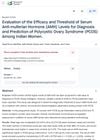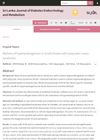 9 citations,
March 2022 in “Frontiers in Endocrinology”
9 citations,
March 2022 in “Frontiers in Endocrinology” About 19.4% of Iranian women in the study have Polycystic Ovary Syndrome, with the most common type involving irregular periods and high male hormone levels, but their heart and metabolic health is similar to women without the condition.
 2 citations,
February 2022 in “Frontiers in Endocrinology”
2 citations,
February 2022 in “Frontiers in Endocrinology” Antiandrogenic pretreatment for women with PCOS does not improve fertility outcomes and delays pregnancy.
 44 citations,
June 2012 in “Endocrinology”
44 citations,
June 2012 in “Endocrinology” High levels of androgens during early development may cause PCOS-like symptoms.
 85 citations,
August 2018 in “Psychological Medicine”
85 citations,
August 2018 in “Psychological Medicine” Women with PCOS are more likely to suffer from depression, anxiety, and stress.
 18 citations,
March 2015 in “Journal of Endocrinological Investigation”
18 citations,
March 2015 in “Journal of Endocrinological Investigation” The research suggests that the ZP4 gene is linked to egg development in women with PCOS but requires more study to understand its role in infertility.
 2 citations,
July 2012 in “Journal of Pediatric and Adolescent Gynecology”
2 citations,
July 2012 in “Journal of Pediatric and Adolescent Gynecology” A 12-year-old girl with very high testosterone and insulin resistance improved with birth control pills, suggesting PCOS can cause high testosterone without tumors.
 September 2022 in “Women's healthcare”
September 2022 in “Women's healthcare” PCOS is managed by lifestyle changes and personalized medication to improve symptoms and fertility.
 10 citations,
January 2019 in “The Nurse Practitioner”
10 citations,
January 2019 in “The Nurse Practitioner” PCOS is a common hormonal disorder in women, treated with lifestyle changes, medication, and patient education.
 1 citations,
January 2022 in “IntechOpen eBooks”
1 citations,
January 2022 in “IntechOpen eBooks” Different PCOS types respond uniquely to infertility treatments, with some having lower pregnancy rates and higher risks of complications.
 January 2022 in “Research Square (Research Square)”
January 2022 in “Research Square (Research Square)” Serum AMH levels are a strong marker for diagnosing PCOS in Indian women.
 68 citations,
January 2022 in “International Journal of Molecular Sciences”
68 citations,
January 2022 in “International Journal of Molecular Sciences” PCOS management includes lifestyle changes and medications, with ongoing research into repurposed drugs for better treatment options.
 December 2021 in “Journal of oncology research reviews & reports”
December 2021 in “Journal of oncology research reviews & reports” Polycystic Ovary Syndrome (PCOS) can lead to diabetes, heart disease, cancer, and mental health problems.
 1 citations,
December 2021 in “Cureus”
1 citations,
December 2021 in “Cureus” Overweight PCOS patients often have skin issues like acne, but all PCOS patients should get lifestyle advice.
60 citations,
June 1997 in “Baillière's clinical obstetrics and gynaecology” PCOS is often caused by hormonal imbalances that can lead to various health issues and may indicate a risk for future metabolic and cardiovascular problems.
 5 citations,
October 2021 in “Journal of Ovarian Research”
5 citations,
October 2021 in “Journal of Ovarian Research” Cinnamon can help manage symptoms of polycystic ovary syndrome, improve menstrual cycles and fertility, and positively affect cholesterol and blood sugar levels, but more research is needed to confirm these effects and find the best dosage.
 13 citations,
September 2008 in “Experimental and Clinical Endocrinology & Diabetes”
13 citations,
September 2008 in “Experimental and Clinical Endocrinology & Diabetes” Young women with PCOS without additional risk factors may have normal heart function.
16 citations,
January 2007 in “Archives of Iranian Medicine” Polycystic ovary syndrome is the main cause of hirsutism in premenopausal Iranian women.
 6 citations,
August 2014 in “Sri Lanka Journal of Diabetes Endocrinology and Metabolism”
6 citations,
August 2014 in “Sri Lanka Journal of Diabetes Endocrinology and Metabolism” The FG score is better at detecting hyperandrogenism in PCOS patients than testosterone levels or FAI, but testosterone is the recommended test for diagnosis.
 1 citations,
December 2023 in “Curēus”
1 citations,
December 2023 in “Curēus” Most children with a common hemochromatosis genotype had elevated iron levels but no severe symptoms.
 21 citations,
September 2021 in “Fertility and Sterility”
21 citations,
September 2021 in “Fertility and Sterility” A blood test level of 3.2 ng/mL of Antimüllerian hormone is good for identifying polycystic ovarian morphology in European women aged 25–45.
 20 citations,
July 2009 in “Journal of Pediatric and Adolescent Gynecology”
20 citations,
July 2009 in “Journal of Pediatric and Adolescent Gynecology” Quick treatment of hair disorders in teenage girls is important because of the emotional effects.
 59 citations,
August 2021 in “Frontiers in Endocrinology”
59 citations,
August 2021 in “Frontiers in Endocrinology” GLP-1 receptor agonists, like Dulaglutide, Liraglutide, and Semaglutide, have potential benefits beyond the pancreas, including neuroprotection, pain suppression, cardiovascular protection, obesity management, and cancer treatment, but there are concerns about pancreatitis and pancreatic cancer risks.
 June 2021 in “Health and Society”
June 2021 in “Health and Society” Healthy lifestyle changes, especially weight loss, can improve symptoms and overall health in people with Polycystic Ovary Syndrome, especially if they are overweight or obese.
 1 citations,
May 2021 in “International Journal Of Medical Science And Clinical Invention”
1 citations,
May 2021 in “International Journal Of Medical Science And Clinical Invention” Women with PCOS may have a higher risk of severe COVID-19 due to hormonal imbalances and vitamin D deficiency.
 April 2023 in “Elsevier eBooks”
April 2023 in “Elsevier eBooks” PCOS is a hormonal disorder causing symptoms like excess hair, acne, irregular periods, and fertility issues.
 60 citations,
October 2014 in “Journal of the American Academy of Dermatology”
60 citations,
October 2014 in “Journal of the American Academy of Dermatology” Dermatologists play a key role in treating skin symptoms of PCOS like dark patches, excess hair, acne, and hair loss.
 2 citations,
March 2020 in “bioRxiv (Cold Spring Harbor Laboratory)”
2 citations,
March 2020 in “bioRxiv (Cold Spring Harbor Laboratory)” HAIR may cause fetal loss by triggering different cell death processes in the uterus and placenta.
 November 2022 in “Journal of the Endocrine Society”
November 2022 in “Journal of the Endocrine Society” A 21-year-old male with a rare genetic disorder experienced sudden hair loss and high DHEAS levels, likely due to a condition similar to PCOS, usually seen in women.
 2 citations,
April 2021 in “Reproductive health of woman”
2 citations,
April 2021 in “Reproductive health of woman” Most women with polycystic ovary syndrome (PCOS) have menstrual issues, infertility, acne, and excessive body hair, with the most common type being the non-androgenic phenotype.
 11 citations,
March 2021 in “Reproductive Biology and Endocrinology”
11 citations,
March 2021 in “Reproductive Biology and Endocrinology” Polycystic Ovary Syndrome (PCOS) symptoms vary globally, with bloating, high cholesterol, and glucose levels being common; the current diagnostic criteria may need refining.



























